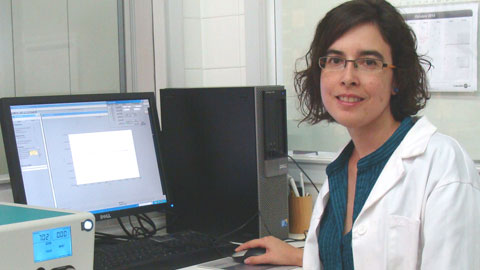Eva Pellicer awarded a L’ORÉAL-UNESCO research fellowship

27/11/2014
L’ORÉAL-UNESCO research fellowships go towards the funding of a research project during the year 2015. The project conducted by Dr Eva Pellicer from the Gnm3 group of the UAB Materials Physics Unit II focuses on the synthesis of metal foams of nanometric pore size. These materials are characterised by having a highly elevated superficial area, thanks to the presence of a large number of nanopores, which make them ideal for catalytic and electrocatalytic applications.
The objective of the project is to manufacture foam with the use of electrochemical technology, where the presence of noble metals such as platinum and palladium is minimised. These metals are expensive and very difficult to obtain, even though until now they are the most used metals in many (electro)catalytic reactions. The foams are used as catalysts to generate molecular hydrogen through the reduction of proton and the water molecule in a neutral and alkaline environment. This makes it an efficient alternative to traditional energy sources based on fossil fuel. The project therefore aims to open new paths through the research of materials and overcome society's current unsustainable need for fuel.
Dr Pellicer, Ramón y Cajal researcher of the UAB Department of Physics, earned her degree in Chemistry in 2000, her master's degree in Experimental Chemistry in 2001 and her PhD in Chemistry in 2005 from the University of Barcelona (UB). She did her postdoctoral research stays at local centres such as the Catalan Institute for Nanoscience and Nanotechnology and international centres such as ETH-Zürich. She has received several awards throughout her career: Westinghouse Prize in 2005, Materials Today Cover Competition 2010, Science As Art from the MRS Spring Meeting 2014. Dr Pellicer is author or co-author of some 100 articles in specialised journals in the field of material sciences, electrochemistry and nanotechnology, which have been cited over 1250 times (index h = 22) and she has offered conferences locally and internationally (3DMR 2011, ISMANAM 2012, ISMANAM 2013, 26th Deutsche Zeolith-Tagung and 3DMR 2014. She has participated in 17 national and European research projects, such as the BioTiNet and MANAQA and currently coordinates the European Tempus project "Development of Sustainable Interrelations between Education, Research and Innovation at WBC Universities in Nanotechnologies and Advanced Materials where Innovation Means Business". Until now, she has directed two PhD theses. Since she began her career, she participated in science popularisation activities addressed to primary students (as an editor of the Eureka journal from 2005 to 2007), secondary students and university students (she participates regularly in the UAB Saturday Physics).
L'ORÉAL-UNESCO Programme
In the past 15 years, the L'ORÉAL-UNESCO For Women in Science programme acknowledges and gives visibility to women researchers from all over the world and works to promote interest in science among women of future generations. This programme is carried out every year with the L'ORÉAL-UNESCO awards to five prestigious scientists in recognition of their excellent trajectory, and with the UNESCO-L'ORÉAL international fellowships for young researchers. The programme also recognises 230 women scientists yearly through the national editions of these awards, celebrated in over 50 countries.
In Spain, the L'ORÉAL-UNESCO For Women in Science programme has developed several initiatives which give visibility to women scientists in our countries and promote the love of science among future generations. The research fellowships, which this year mark their 9th edition, are a clear example of this type of commitment.